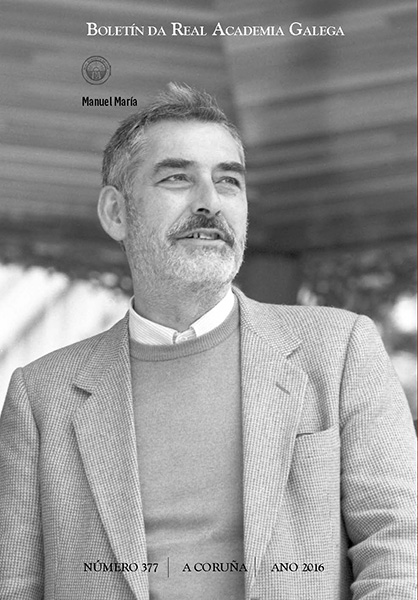Un muiñeiro de verbas no corazón da escola
Descargas
Publicado
Cómo citar
Número
Sección
DOI:
https://doi.org/10.32766/brag.377.510Palabras clave:
ditadura, escola, pioneiro, mestre, idioma, fala, diglosia, Vagalume, normalización, ética, compromiso, lirismo, autenticidade, liberdade, infancia, ponte, poema, música, dramatización, narración, redes sociais, gozo, gratitudeResumo
Na infancia modelamos a conduta e construímos a nosa identidade. Nesta formación, a escola ten un papel decisivo. A valiosa achega da obra de Manuel María é incuestionable. A forza da súa palabra e a súa inquebrantable e profunda convicción fixeron que a súa obra resultara, e resulte (non hai máis que comprobar nas redes sociais a repercusión que está a ter nos centros de ensino de toda Galicia), inmensamente eficaz na recuperación da nosa identidade como pobo, contribuíndo, así, á normalización, asemade que a saborear a beleza da lingua galega.
Os que comezamos a exercer a docencia canda implantación da EXB (1970), estamos especialmente en débeda con el. Viñamos dun tempo de portas pechadas e, na súa obra (non só a infantil), atopamos chaves sedutoras que nos conquistaron. Parte daquela rapazada, hoxe ensinantes, procuran que o seu alumnado volva sentir ese lóstrego capaz de facer brillar as cousas sinxelas (por algo o alcumaron Deus das pequenas cousas). Manuel María obrou o prodixio de resucitar lúas, ventos, ríos e camiños ata entrar coa súa palabra no corazón da escola. Nela pousou a palabra con verdade e con beleza, compartindo a súa visión do mundo e a súa maneira de estar nel.
Descargas
Citas
Blanco Torrado, Alfonso (coord.) (2001): Manuel María. [libro homenaxe / organizado pola] Asociación Cultural Xérmolos. Lugo: Ophiusa.
Ledo Andión, Margarita (2016): Manuel María: Eu son fala e terra desta miña terra [filme]. [Galicia]: Nós, Produtora Cinematográfica Galega.
Manuel María (1968): Os soños na gaiola. Lugo: Cartonaxes Anmi.
Manuel María (1969): Barriga Verde. Vigo: Edicións Castrelos.
Manuel María (1979): As rúas do vento ceibe. A Coruña: Edicións Xistral / Asociación Socio-Pedágóxica Galega.
Manuel María (1990): Os soños na gaiola. Vigo: Edicións Xerais de Galicia.
Manuel María (1993): Antoloxía poética. A Coruña: Espiral Maior.
Manuel María (1981): Aventuras e desventuras dunha espiña de toxo chamada Berenguela. Santiago de Compostela: Edicións Xistral / Asociación Socio-Pedágóxica Galega.
Manuel María (2015): Poemas escollidos. Manuel María. [Outeiro de Rei]: Fundación Manuel María de Estudos Galegos.
Manuel María (2016): Antoloxía poética. Vigo: Galaxia. Edición de Darío Xohán Cabana e Amelia Outeiro Portela.
Queixas Zas, Mercedes (2016): Labrego con algo de poeta. Biografía de Manuel María. Vigo: Galaxia.
Vagalume: publicación infantil e xuvenil. Santiago de Compostela, n.º 1 (1/I/1975) – n.º 46 (/V/1978).
Zuaza, Luis Ahumada (2008): “El teatro para niños de Carmen Conde”, Cuadernos de Literatura Infantil y Juvenil 216, 26-36.











